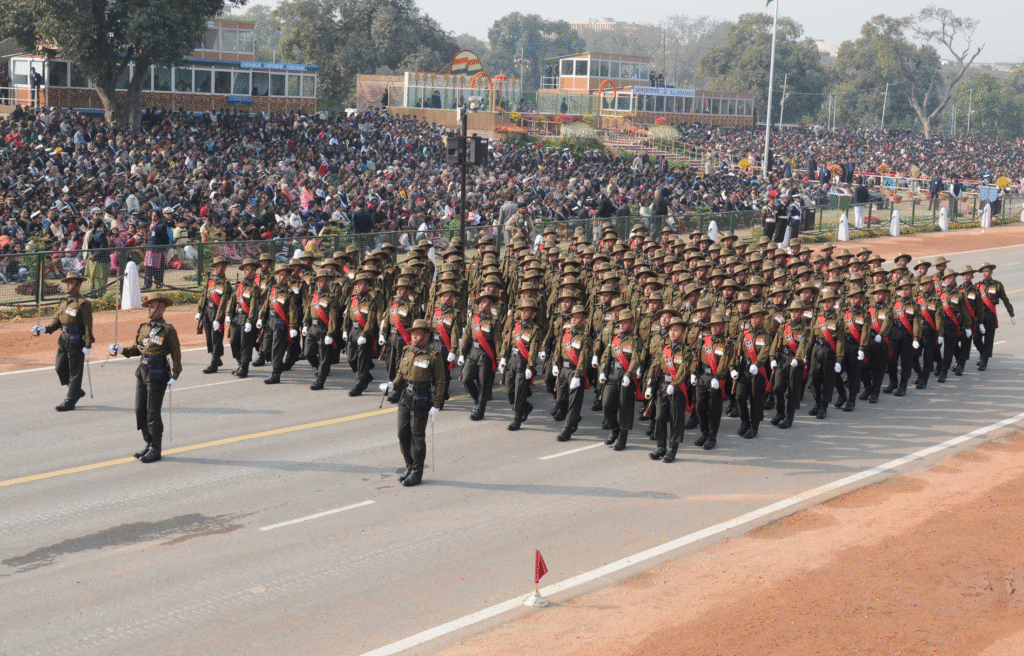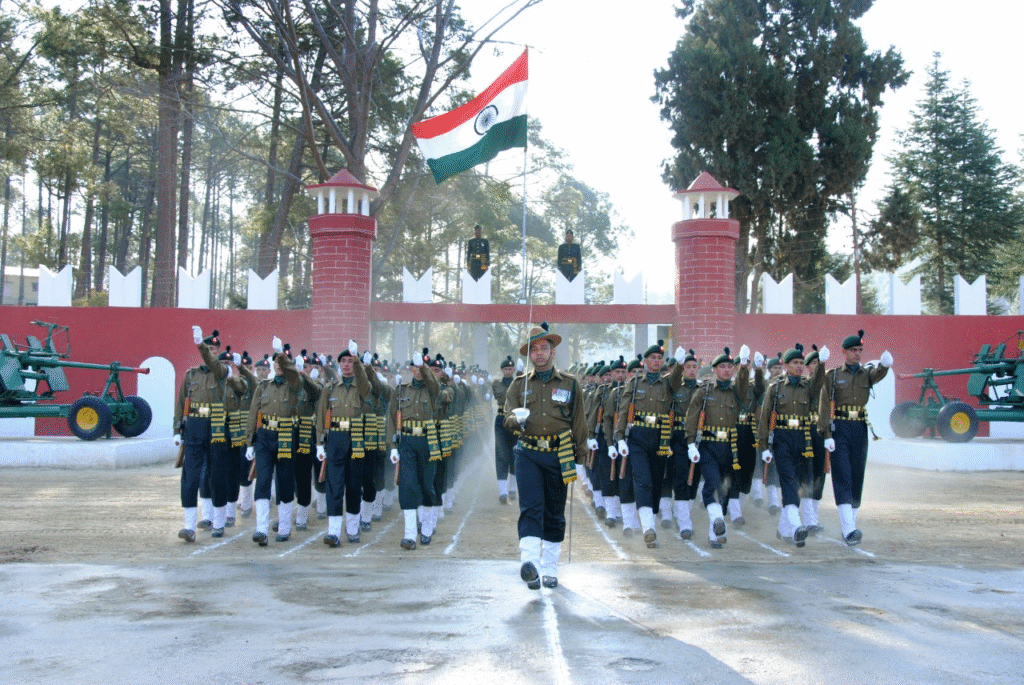Table of Contents
The Indian Army is a bastion of courage, sacrifice, and unparalleled bravery. Every regiment has a glorious history, but some have been tested in the fires of combat more than others. This article explores the top 10 regiments in the Indian Army, ranked based on their extensive battle experience, gallantry awards, and legendary status on the battlefield.
These are the units whose very names evoke respect and fear in the hearts of enemies. They are the epitome of what it means to be a soldier.
1. The Sikh Regiment

When you speak of courage, the Sikh Regiment is often the first name that comes to mind. As one of the most decorated regiments in the world, their war cry, “Jo Bole So Nihal, Sat Sri Akal!”, has echoed across countless battlefields.
Why they are legendary:
- Most Decorated: They have an incredible number of gallantry awards, including the most Param Vir Chakras for an infantry regiment.
- Battle of Saragarhi: The legendary last stand where 21 Sikh soldiers fought against 10,000 Afghans is a story of epic bravery studied globally.
- Every Major War: From the World Wars to Kargil, the Sikh Regiment has been at the forefront, consistently proving their mettle.
2. Gorkha Rifles

“If a man says he is not afraid of dying, he is either lying or he is a Gorkha.” This famous quote by Field Marshal Sam Manekshaw perfectly captures the spirit of the Gorkha Rifles. With their iconic Khukri and fearsome war cry, “Ayo Gorkhali!” (The Gorkhas are here!), they are among the most feared soldiers in the world.
Why they are legendary:
- Unmatched Ferocity: Renowned for their courage and skill in close-quarter combat.
- Mountain Warfare Experts: Their ability to fight in the toughest Himalayan terrains is unparalleled.
- Global Recognition: They have served with distinction in nearly every conflict, earning respect from allies and enemies alike.
3. Rajputana Rifles

As the oldest rifle regiment in the Indian Army, the Rajputana Rifles carry a legacy that stretches back to 1775. Their motto, “Veer Bhogya Vasundhara” (The Brave Shall Inherit the Earth), is a testament to their warrior spirit.
Why they are legendary:
- Oldest and Boldest: Their long and distinguished history is filled with countless tales of valor.
- Kargil Heroes: They played a pivotal role in the 1999 Kargil War, capturing strategic peaks like Tololing with unflinching bravery.
- Highest WWI Honors: They earned more battle honours than any other Indian regiment during the First World War.
4. The Grenadiers

The Grenadiers have a unique and powerful distinction: they have won the most Param Vir Chakras, India’s highest military honor. This alone places them in the elite echelons of the most battle-hardened units.
Why they are legendary:
- Home of the Bravest: Awarded the most PVCs, showcasing their exceptional courage in the face of the enemy.
- Battle of Longewala: Though a different regiment famously held the post, Grenadiers battalions were instrumental in the larger battle.
- Heroes of 1965: The legend of Company Quarter Master Havildar Abdul Hamid, who single-handedly destroyed multiple enemy tanks, is a source of immense pride.
Also Read : (Top 20 Richest Person in India)
5. Punjab Regiment

One of the oldest and most senior infantry units, the Punjab Regiment has a formidable combat record. Their soldiers are known for their resilience and determination.
Why they are legendary:
- Battle of Longewala (1971): A single company of the Punjab Regiment famously held off an entire Pakistani tank regiment, a feat immortalized in the movie “Border.”
- Extensive History: They have fought in almost every major conflict, from the colonial era to modern times.
- “Land of the Lions”: Hailing from the martial lands of Punjab, their fighting spirit is ingrained in their DNA.
6. Kumaon Regiment

The Kumaon Regiment is synonymous with heroism in the high Himalayas. Their tales of courage, especially during the 1962 Sino-Indian War, are a part of India’s national fabric.
Why they are legendary:
- Battle of Rezang La (1962): One of the most glorious last stands in military history, where the ‘C’ Company of the 13th Kumaon fought to the last man, inflicting massive casualties on the enemy.
- First Param Vir Chakra: The first PVC was awarded to Major Somnath Sharma of the 4th Kumaon for his bravery in 1947.
- Mountain Warriors: Like the Gorkhas, they are exceptional high-altitude warfare specialists.
7. Madras Regiment

The oldest infantry regiment of the Indian Army, the Madras Regiment has the longest and most continuous record of service. Their motto is “Swadharme Nidhanam Shreyaha” (It is a glory to die doing one’s duty).
Why they are legendary:
- Oldest Regiment: Their history dates back to the 1750s, giving them unparalleled combat experience over centuries.
- Versatile Force: They have served in every type of terrain, from the jungles of the North-East to the deserts of Rajasthan.
- “Thambis”: Affectionately known as “Thambis” (younger brother in Tamil), their soldiers are known for their discipline and reliability.
8. Bihar Regiment

Known for their toughness and warrior ethos, the Bihar Regiment has quickly cemented its place among India’s elite forces. Their war cry, “Jai Bajrang Bali!”, is a call to courage.
Why they are legendary:
- Kargil War: The 1st Battalion of the Bihar Regiment (1 Bihar) played a crucial role in capturing key positions in the Batalik sector during the Kargil War.
- Galwan Valley (2020): The commanding officer and soldiers of 16 Bihar showed immense bravery during the clashes in the Galwan Valley.
- Tough as Nails: Recruited from a land known for its resilient people, their soldiers are renowned for their physical and mental toughness.
9. Maratha Light Infantry

Drawing inspiration from the armies of the great Maratha warrior, Chhatrapati Shivaji Maharaj, Maratha Light Infantry is famous for its tenacity and guerrilla warfare tactics. Their war cry is “Bol Shri Chhatrapati Shivaji Maharaj Ki Jai!”.
Why they are legendary:
- Historic Warriors: They carry the legacy of one of India’s greatest martial traditions.
- Fierce Fighters: Known for their aggressive spirit and never-say-die attitude in battle.
- Decorated Past: They have earned numerous honors, including several Victoria Crosses and post-independence gallantry awards.
10. Jammu and Kashmir Rifles

The Jammu and Kashmir Rifles regiment has a unique history and has been at the heart of conflict since 1947. Having operated continuously in one of the world’s most challenging conflict zones, their battle experience is intense and constant.
Why they are legendary:
- Kargil’s Lions: The 13th Battalion, JAK RIF, was awarded the title “Bravest of the Brave” for their incredible feats in the Kargil War.
- Two PVCs in One War: They earned two Param Vir Chakras in the Kargil War alone, for the heroic actions of Captain Vikram Batra and Rifleman Sanjay Kumar.
- Constant Combat: Their perpetual deployment along the Line of Control makes them one of the most operationally experienced regiments.
Frequently Asked Questions (FAQs)
Q: Which is the No 1 regiment in the Indian Army?
A: While every regiment is exceptional, the Sikh Regiment is often considered No. 1 due to its incredible number of gallantry awards and extensive battle history.
Q: Which regiment has the most Param Vir Chakras (PVC)?
A: The Grenadiers hold the record for the most Param Vir Chakras, having been awarded three.
Q: What is the oldest regiment in the Indian Army?
A: The Madras Regiment is the oldest infantry regiment, with a history dating back to the 1750s.
Q: Why are the Gorkha Rifles so famous?
A: The Gorkha Rifles are famous for their unmatched bravery, ferocity in close-quarter combat with their khukri, and a global reputation as elite warriors.
This list of the top 10 regiments in the Indian Army represents the pinnacle of military valor. While we highlight these ten, it’s a tribute to every soldier who wears the uniform.
Jai Hind!









